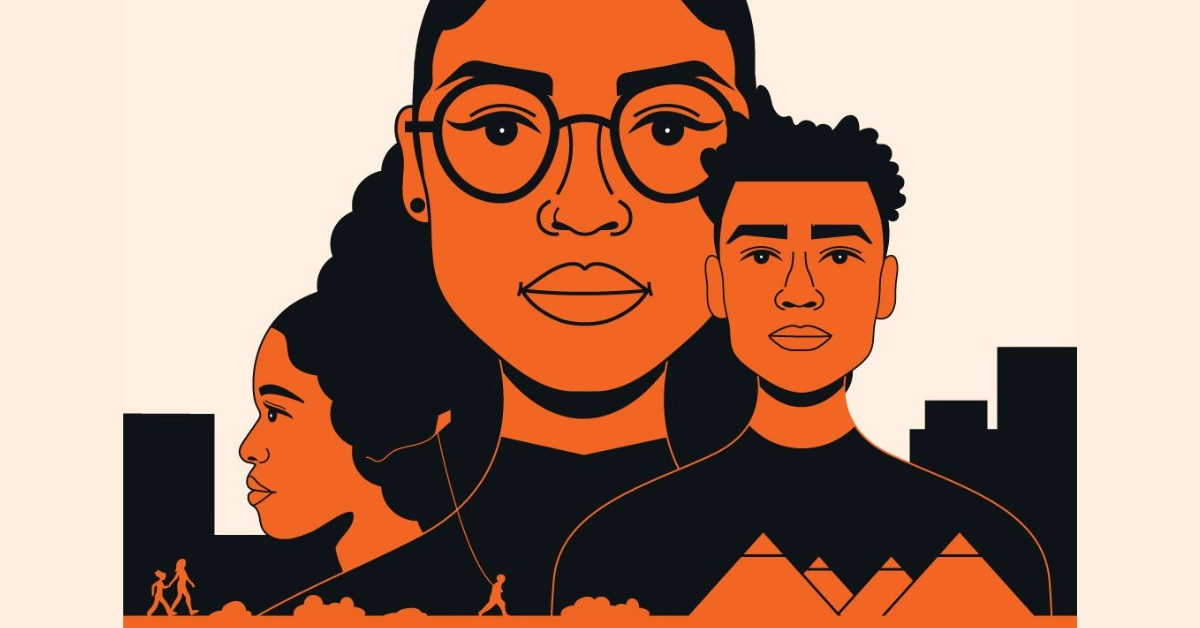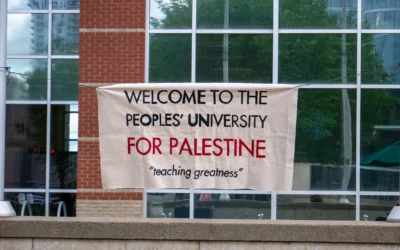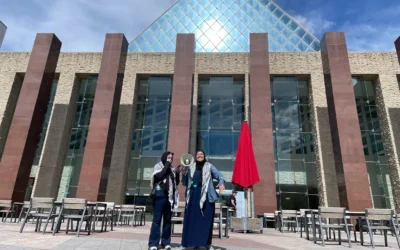UPDATE MARCH 21, 2024: This article has been edited to change the name of MacEwan’s Office of Human Rights, Equity, and Inclusion to Office of Human Rights. A member of the office informed the Griff that the office changed its name shortly before this event took place without a formal announcement. The phrase “MacEwan’s Black-Canadian community” has been changed to “MacEwan’s Black community.”
On Feb. 28, a long line of students, faculty, and community members stood outside of the SAMU Lookout for the Black Stories of Belonging event. The forum was the second event for the winter term’s Interdisciplinary Dialogue Project (IDP) which pursues the theme “Cities of Tomorrow.” A multi-month-long effort between IDP, MacEwan’s Office of Human Rights, SAMU, and on-campus organizers of Black History Month brought the night’s events to fruition. The doors opened at 5 p.m. to a rousing evening of activities and discussions centred on belonging. Every corner of the SAMU Lookout, across the hall, and down the stairs marked the local collaboration between various MacEwan staff, artists, and Black-owned businesses.
Organizers handed attendees bingo cards with five separate checkboxes. The bingo cards encouraged players to participate in an art table, food, music, a discussion with two Black Edmontonian creatives, and Stories of Belonging, a video series illuminating experiences from members of MacEwan’s Black community. After getting a sticker for engaging in each box’s directions, attendees could submit their full bingo cards into a draw for a gift from a local, Black-owned business.
The night began with a quick introduction to the space and Office of Human Rights from two of their staff: Evelyn Asiedu, director of program delivery and education, and Rondah Worrell-Maik, who works in education and engagement. They both sat in on a call for a post-event interview.
Asiedu said that she provided a land acknowledgment, “relating my experiences as a Black person, as a first gen to Canada, and what that means to be a settler.”
The number of attendees shocked Worrell-Maik. “We had only put out 60 chairs in total…,” she said. “… I was just like, I can’t believe my eyes right now. It was so cool to see. It made us so happy…”
“Belonging, of course, is something we think about a lot in our line of work,” said Asiedu. She and Worrell-Maik try to foster a sense of community through education and engagement. While there are challenges, they agree that their work is rewarding and a privilege.
“… the joy of seeing people feel like they belong somewhere and being able to cultivate those spaces is kind of unmatched…,” said Worrell-Maik. She feels true belonging when she can bring her entire self to a space and believes “that all of the elements of who I am are welcome.” Asiedu added, “I also think belonging can be a feeling within yourself… it can start within yourself.”
Then, the music began, courtesy of La Connexional, a social enterprise and creative consulting agency that puts on events across the province and just recently, in Vancouver. On their website, La Connexional says that they draw inspiration from “African diaspora and Latin cultures.” Ameena Matano, their assistant event coordinator, said, “We showcase Black culture, Black artists, Black talent… it’s to bring communities together.” Eugene Ncube is La Connexional’s music director. He said, “We want to… make sure that all our people are represented.”
One of the bingo boxes which was eating delicious food, was quickly stickered as attendees enjoyed a free meal of various culturally significant foods, like a Jamaican Patty or a DG Pineapple soft drink. The Bajan Chef, Saffron’s Caribbean Delight, and Tantalizers Cuisine catered for the event.
“I wanted food to be the medicine this year,” said Macey Edem Nortey, SAMU’s student programs manager. As a Ghanaian woman, Nortey’s part in bringing diverse food to SAMU meant “showcasing to our community that there’s so much love in the vast majority of Afro-Caribbean Latinx culture.”
Three-time slots were available downstairs for a conversation circle with Edmontonian creatives Kija Lado and Medgine Mathurin. The first two slots were per registration through IDP’s mêskanâs. While the first slot was open for all attendees, the second one was reserved for racialized participants. Mathurin defined belonging as a state of wholeness. Lado said her wish is that, “we don’t have to leave parts of ourselves at the door.”
Mathurin is a trilingual spoken word artist. Her verse ranges from French, Creole, to English. She was born in Haiti and raised in Canada. During the first time slot, she sat on the front bench and read two poems from her debut chapbook, Waiting in the Land of the Living, or, in French, Attendre dans le monde des vivants. After reading her second poem, “Birthmark,” she said that her mother’s birthmark is her resilience. Writing the poem took emotional labour, but it led to a conversation with her family. The poet tied this to Afro-futurism and the power of reclaiming narratives through art.
Lado describes herself as a south Sudanese musician and multidisciplinary artist. She sat beside Mathurin, a guitar in her lap and an amp beside her, as she introduced her song “Catharsis.” Lado wrote the song to name her own and her mother’s grief. She said grieving properly is the first step to healing and liberation.
Back upstairs, a screen circled through MacEwan’s Stories of Belonging. The 10 interviews which were edited and produced by communications students Aajah Sauter and Emilie Rubayita, were also on display in the library over February. Sheena Rossiter and Sasha Stanojevic were the supervising producers on the project, and Worrell-Maik was the executive producer. Participants shared moments in which they felt they belonged in their communities and at MacEwan.
For instance, Nike Fabiyi, a development officer and MacEwan alumna said that she felt a strong sense of belonging when she was a member of MacEwan’s Afro-Caribbean club. Years later, the club evolved into the Black Students’ Alliance of MacEwan University (BSAMU). Like Fabiyi, Rubayita explained in her video how she felt a sense of belonging on campus when she joined BSAMU.
Three tables in the Lookout had art supplies for attendees to create a personal piece of belonging. Catherine Dyer works in the Centre for Teaching and Learning as an educational developer. She organized the tables, as well as other art sessions on campus. Part of Dyer’s job is to “support faculty in their teaching”. For instance, come September, she plans to conduct sessions directed at faculty on fostering belonging in the classroom. She knows academic belonging is critical for a student’s performance and that individual reflection helps in processing information. She says, “Art is a way that we create belonging, and it’s a lever just as food, dance, or storytelling. And so art is another way for people to tell their stories.”





0 Comments